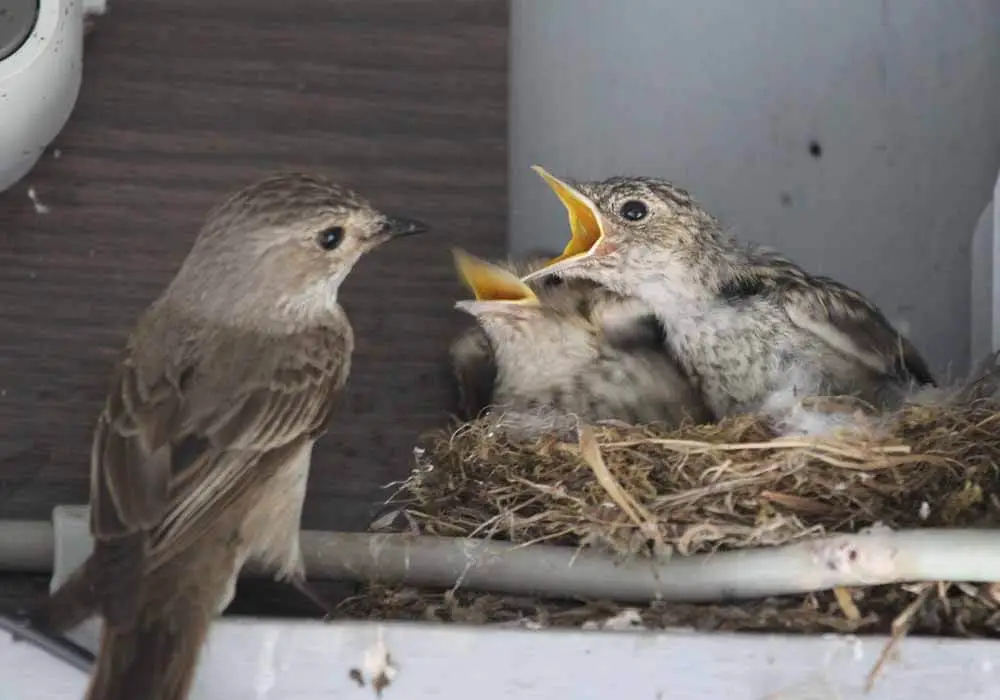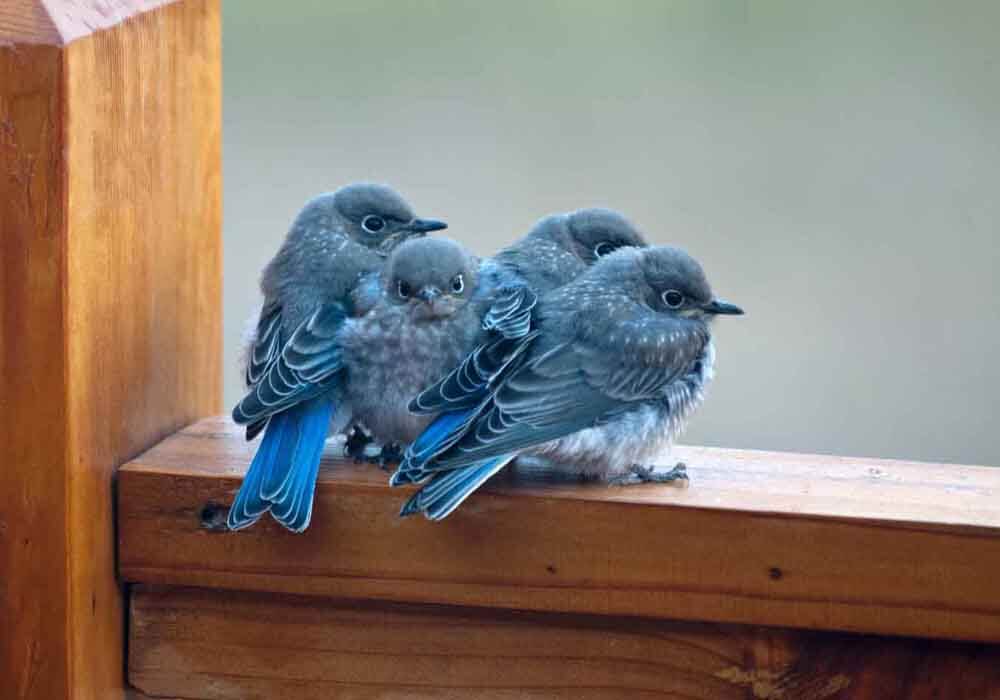Bird Nesting Habits & Behaviors
Birds are some of the few animals that build homes for themselves. They build nests to shelter their eggs and raise their offspring. However, the types of nests built and the preferred locations largely depend on bird species.
Here are some universal facts about bird nesting habits and behaviors...
Bird nesting habits tend to vary from species to species. Some birds build nests from scratch using natural or man-made materials, while others prefer trunks or abandoned structures. You can find nests anywhere, including on trees, cliffs, and human-made structures.
Building a nest is among the most significant bird activities because it provides shelter, protects the bird from predators, and is essential for brooding. Read on for more details on how long birds stay in nests and why, if at all, they abandon their nests.

Do Birds Leave the Nest at Night?
Birds do not sleep in their nests at night except when they have eggs or a brood of babies. During the nesting season, birds stay in the nest at night to keep their young ones and eggs warm and protect them from predators.
Non-nocturnal birds seek safe places to roost at night. They find dense foliage, tree niches, and cavities, or perch high up on trees safe from weather and away from predators. Smaller birds perch on high trees close to the trunks, which are still warm from the sun. Some birds utilize birdhouses, especially if there is a source of food and water nearby. They also rest on ledges, roofs, and barns.
Many bird species hurdle at night to keep warm and safe from predators. Perching birds stand or sit with clasped feet and claws tightly locked to prevent falling. They puff out their feathers and then tuck in their bill and feet to minimize loss of body heat.

Here's an interesting question...What do birds do at night? Do they go on some sort of nocturnal secret mission? Do they visit with friends or relatives? Find out the whole truth in this interesting article of ours.
Do Birds Leave Their Nest After Eggs Hatch?
Mother birds do not usually sleep or spend long periods in the nest with their babies. They perch in the same tree to watch the young ones closely, especially in the first seven days when the nestlings are most vulnerable and constantly need care. They only leave for food.
Birds that lay eggs during early spring must battle freezing temperatures. One of the parents must keep the baby birds warm if the babies cannot regulate their body temperature. In such cases, the mother bird must spend some nights in the nest to keep the nestlings warm.
Birds can typically care for themselves within three weeks of hatching. The mother might stay about 2 - 3 weeks after the eggs hatch. After that, the parent bird only visits the offspring occasionally but remains close to guide them to food and protect them. After one or two months, she stops checking on them and only interacts with them in the large group.
Do Baby Birds Leave the Nest and Come Back?
Baby birds do not return after they leave the nest, but they remain dependent on their parents for a while. During this time, the babies are extremely vulnerable to starvation (and predators) and must learn survival skills.
Once they can fend for themselves, the babies leave for good and never return. Although the young ones are scattered, their parents can find them easily because they are constantly chirping. When the parents appear with insects or worms, the juveniles open their beaks and wave their wings to beg for food.
When Do Birds Leave the Nest for Good?
Baby birds exit the nest at different times depending on their species. However, most young birds leave the nest 12 to 21 days after hatching. Mother birds leave the nest when their babies can fend for themselves, which can take up to 3 weeks.
When the chicks remain in the nest, the parent birds feed and protect them from predators. After leaving the nest, the parents may continue caring for them for a few more days. The parents go when their young ones can fly and hunt independently.
Sometimes, the mother stays close, feeding and caring for the young birds, eventually stopping. This natural behavior is essential for babies to acquire survival skills. Once they master the skill, they can survive in the wild.

Get all the specifics on exactly how birds leave the nest. We explain this fascinating journey in detail in this article of ours here.
Why Do Birds Abandon Their Nests?
Birds usually abandon their nests when the nests have been disturbed or destroyed. They will also leave their nests when the nesting season is over, the food is insufficient, or there is an insect infestation.
Here is a more detailed look at each of these reasons.
- A disturbed or destroyed nest: Birds take about two weeks to build a nest if the materials are readily available. When a nest is destroyed, the bird opts to abandon their eggs or hatchlings and start over elsewhere. Additionally, a bird may move to a safer location if a predator attacks the nest, even if the attacker does not take away the eggs or babies.
- Insufficient food: When the food supply is limited, a mother bird may choose to preserve her energy instead of wasting it on a nest or offspring with low chances of survival. She will save her life when she cannot save her young ones. Sometimes, the mother bird chooses to feed the more robust chicks and leave the weaker ones to starve to death instead of losing all of them.
- Insect infestations: A nest infested with mites, ticks, flies, or ants may be unhealthy and unbearable for the bird sitting on eggs. The bugs might also be feeding on the baby birds. The mother may judge that it is not worth investing her energy in incubating the eggs or caring for the babies and instead opt to seek a new home.
- The breeding season is over: Once the young birds are old enough and leave the nest, the parent birds leave their old nests and build new ones for the new breeding season. Also, male birds that make multiple nests to attract more mates live in one nest after mating and abandon the rest.
Do Birds Use Abandoned Nests?
Birds use abandoned nests if the nest is sturdy enough for reuse. A bird will reuse a nest if it is large enough to build on top or if it is convenient to use the available material. When a bird uses an abandoned nest, the bird clears the nest out or adds new materials on top.
Some birds reuse nests because the nest’s location is ideal. Birds usually build their nests in various places, such as tree branches, underground nests, and hollow cavities. The material also varies depending on the environment.
Birds also recycle materials from other birds’ nests to build new ones. If the bird does not like how the old nest is made, they dismantle it and use the materials to create their own.
Do Birds Abandon Their Nest if Humans Touch It?
Birds can abandon their nest if humans touch it and the bird notices the disturbance. Contrary to popular belief, birds cannot detect human scent in their nest or on their eggs. They know the nest was touched when they find it different from how it looked.
When you realign or move the nest, whether intentionally or not, the bird will notice the disturbance. The bird might consider that location dangerous and abandon the nest and any eggs or young ones in it. However, the bird will stay if they find the nest looking just as it left it.
Birds invest significant amounts of energy and time in building nests. They are unlikely to throw all their hard work away without cause.
Bird Nesting Habits...Final Thoughts
Each bird species has different nesting habits, ranging from where they build their nests to how long parents care for their offspring after hatching.
However, most bird species have one common practice: the parent birds usually pick a spot to nest to protect their eggs and young ones from predators.
Back To The TOP Of This Bird Nesting Habits Page

About the Author...
Richard Worden, a dedicated bird lover for over 20 years, I love to share my in-depth knowledge and passion for birds. Read more About Me and my expertise in this field.
- We Know Birds HOME ›
- Bird Flight and Nesting Facts ›
- Bird Nesting Habits & Behaviors



